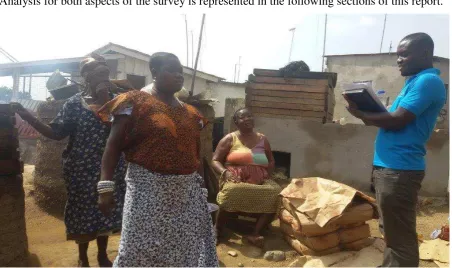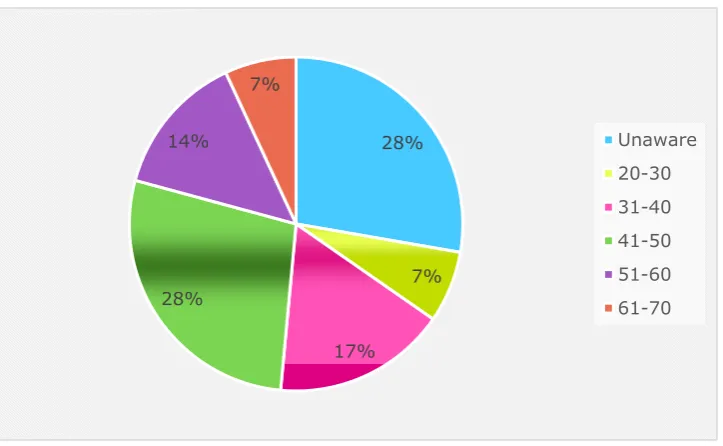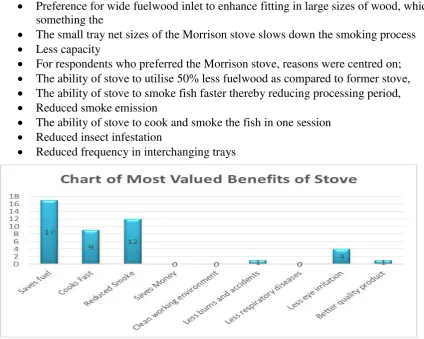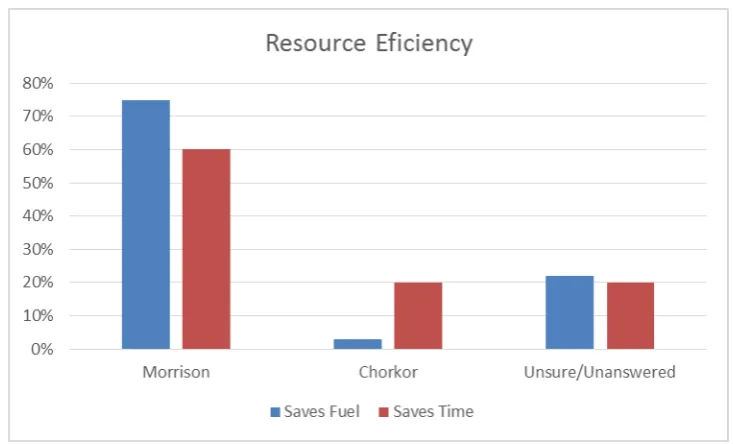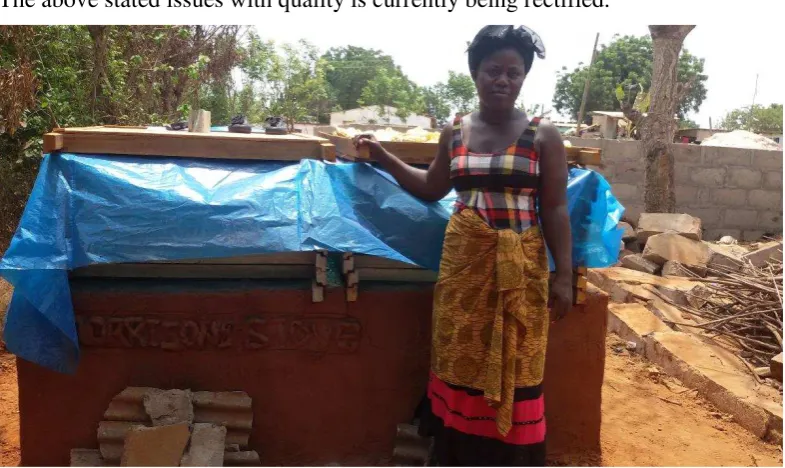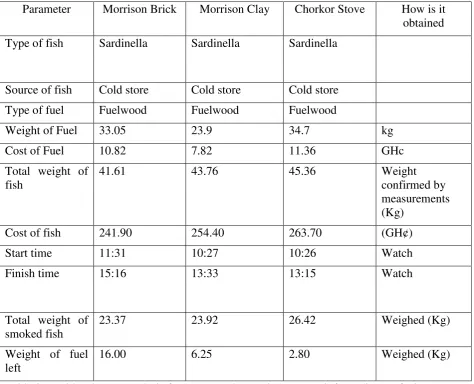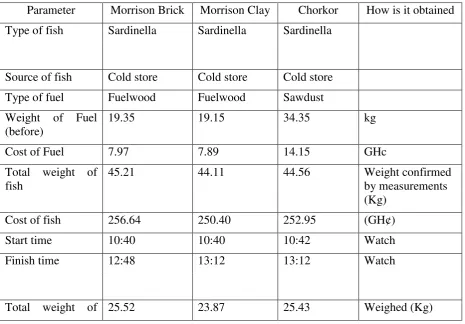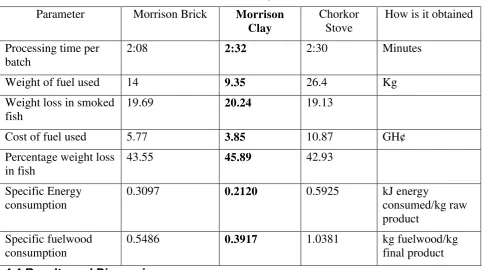SUSTAINABLE FISHERIES
MANAGEMENT PROJECT (SFMP)
Evaluation Report on Morrison
Stoves.
This publication is available electronically on the Coastal Resources Center’s website at
http://www.crc.uri.edu/projects_page/ghanasfmp/
For more information on the Ghana Sustainable Fisheries Management Project, contact:
USAID/Ghana Sustainable Fisheries Management Project Coastal Resources Center
Graduate School of Oceanography University of Rhode Island
220 South Ferry Rd.
Narragansett, RI 02882 USA
Tel: 401-874-6224 Fax: 401-874-6920 Email: [email protected]
Citation: Avega, B., Nsiah, A., Kwarteng, E. (2016). Evaluation Report on Morrison Stoves. The USAID/Ghana Sustainable Fisheries Management Project (SFMP). Narragansett, RI: Coastal Resources Center, Graduate School of Oceanography, University of Rhode Island and SNV Netherlands Development Organisation. GH 2014_ACT077_SNV. 28 pp.
Authority/Disclaimer:
Prepared for USAID/Ghana under Cooperative Agreement (AID-641-A-15-00001) awarded on October 22, 2014 to the University of Rhode Island and entitled; the USAID/Ghana Sustainable Fisheries Management Project (SFMP).
This document is made possible by the support of the American People through the United States Agency for International Development (USAID). The views expressed and opinions contained in this report are those of the SFMP team and are not intended as statements of policy of either USAID or the cooperating organizations. As such, the contents of this report are the sole responsibility of the SFMP Project team and do not necessarily reflect the views of USAID or the United States Government.
Detailed Partner Contact Information:
USAID/Ghana Sustainable Fisheries Management Project (SFMP) 10 Obodai St., Mempeasem, East Legon, Accra, Ghana
Telephone: +233 0302 542497 Fax: +233 0302 542498
Maurice Knight Chief of Party [email protected]
Kofi Agbogah Senior Fisheries Advisor [email protected] Nii Odenkey Abbey Communications Officer [email protected]
Bakari Nyari Monitoring and Evaluation Specialist [email protected] Brian Crawford Project Manager, CRC [email protected]
Justice Odoi USAID Administrative Officer Representative [email protected] Kofi.Agbogah
SNV Netherlands Development Organisation #161, 10 Maseru Road,
E. Legon, Accra, Ghana 233 30 701 2440
Donkris Mevuta Kyei Yamoah
[email protected] Friends of the Nation Parks and Gardens Adiembra-Sekondi, Ghana 233 312 046 180
Peter Owusu Donkor Spatial Solutions
[email protected] #3 Third Nautical Close,
Nungua, Accra, Ghana
Darkuman Junction, Kaneshie Odokor Highway
Accra, Ghana 233 302 315894
Gifty Asmah
[email protected] Daasgift Quality Foundation
Headmaster residence, Sekondi College Sekondi, Western Region, Ghana 233 243 326 178
For additional information on partner activities:
CRC/URI: http://www.crc.uri.edu
CEWEFIA: http://cewefia.weebly.com/
DAA: http://womenthrive.org/development-action-association-daa Daasgift:
https://www.facebook.com/pages/Daasgift-Quality-Foundation-FNGO/135372649846101 Friends of the Nation: http://www.fonghana.org Hen Mpoano: http://www.henmpoano.org
SNV: http://www.snvworld.org/en/countries/ghana SSG Advisors: http://ssg-advisors.com/
ACRONYMS
AWEP Association of Women for the Preservation of the Environment MES Morrison Energy Services
SNV SNV Netherlands Development Organisation SFMP Sustainable Fisheries Management Project
TABLE OF CONTENTS
ACRONYMS ... ii
TABLE OF CONTENTS ... iv
LIST OF FIGURES ... v
LIST OF TABLES ... v
EXECUTIVE SUMMARY ... 1
INTRODUCTION ... 2
1.1 Objective ... 3
1.2 Brief ... 3
2.0 METHODOLOGY ... 4
3.0 EVALUATION PART 1: BENEFICIARY SATISFACTION ANALYSIS... 4
3.1 Understanding the Target Group ... 5
3.2 Use of Stoves ... 5
3.3 Beneficiary Satisfaction ... 6
3.4 Resource Efficiency ... 7
3.5 Stove Financing ... 8
3.6 Stove Quality ... 8
4.0 EVALUATION PART TWO: ENERGY ASSESSMENT ON STOVES ... 9
4.1 Comparative Assessment between the Chorkor, Morrison Brick and Morrison Clay stoves... 9
4.2 Test 1 ... 9
4.3 Test 2 ... 11
4.4 Results and Discussion ... 13
4.5 Smoking Time ... 13
4.6 Better Drying ... 14
4.7 Specific Energy (fuelwood) Consumption (SEC)... 14
4.8 Efficiency improvement... 14
5.0 CONCLUSION ... 14
6.0 RECOMMENDATION ... 14
LIST OF FIGURES
Figure 1: Emmanuel Kwarteng (SNV Staff) interviewing Esi Akyineba, a demonstration
stove host at Winneba ... 4
Figure 2: Ages of Respondents ... 5
Figure 3: Most Valued Benefits of Stove ... 6
Figure 4: Beneficiary Satisfaction ... 7
Figure 5: Resource Efficiency ... 7
Figure 6: Sharon Ghartey by her newly built improves stove ... 8
LIST OF TABLES
Table 1: Test 1 Raw Data ... 10Table 2: Test 1 Analysis ... 11
Table 3: Test 2 Raw Data ... 11
Table 4: Test 2 Analysis ... 13
EXECUTIVE SUMMARY
Fish is an important source of food and income to many people in the developing world. In Africa, some 5 percent of the population, about 35 million people, depend wholly or partly on the fisheries sector, mostly artisanal fisheries, for their livelihood. The Ghana Fisheries and Aquaculture Development Plan for 2011 – 2016 stated that the country has access to significant and valuable stocks of fish; total domestic production, including aquaculture, is roughly 440,000 tons each year.
The introduction of improved fish smoking technologies has become necessary for value addition; to increase yields and subsequently improve the livelihoods of fish processors. The introduction of the Chorkor fish smoking stove was very critical to increasing smoked fish production towards the reduction of post-harvest fish losses in Ghana. Thus fish processors were able to smoke more fish within a smoking cycle than earlier.
Years later, another improved fish smoking stove; the Morrison Fish smoking stove was designed and piloted in New Takoradi in the Western Region and along the Eastern coasts of Ghana, with the support of a number of NGOs including Daasgift Quality Foundation, CHF and SNV.
SNV under the Improved Fish Smoking Project has installed 285 Morrison stoves in parts of the eastern coastal fishing communities of Ghana, specifically the Keta and Ada East
Districts. The beneficiaries confirmed the energy efficiency potential of the stove and
provided additional information on benefits, such as; cooks faster, emits less smoke, gives an appealing fish outlook and dries the fish better. The Energy efficiency potential of the stove was one main characteristic that drove the promotion of the stoves because of the
conspicuous savings on wood fuel, which translates into reducing the rate of deforestation to an extent.
Based on the successes Under SNV’s previous Improved Fish Smoking project, SNV
introduced and promoted the improved Morrison fish smoking stoves to the new Sustainable Fisheries Management Project as a potentially scalable support programme towards
improving the livelihood of fish processors.
Based on SNV’s proposal, the Morrison stove was adopted and piloted under the USAID/Ghana Sustainable Fisheries Management Project in five communities in the Central Region; namely Winneba, Apam, Senya Bereku, Gomoa Feteh and Ankaful. A total of 48 Morrison stoves have been installed since 2014.
An evaluation survey was carried out early March 2016 to evaluate the energy efficiency and the satisfaction of beneficiaries of the 48 stoves piloted. Questionnaires, focus group
discussion and energy audits were employed to meet the objectives of the survey. A sample size of 35 fish processors who were supported with the Morrison stove were selected for the survey across four communities, with the exception of Ankaful, because the stoves were under construction during the evaluation period. All respondents were females. Of the 48 stoves, 11 stoves were installed at Apam, 13 at Winneba, 11 at Senya Bereku, 6 at Gomoa Feteh and 7 at Ankaful.
All the same, the respondents also had a number of challenges with the stove; paramount being the small capacity of the stove as compared to the chorkor stove and the small opening of the fire chamber. Some of the respondents, especially the hosts of the demonstration stoves, also mentioned that, the small mesh sizes slowed down the smoking process for large fishes.
Generally the construction of the stoveswas well carried out to standard. Most of the
beneficiaries had received their full set of stove (16 trays, double unit stove base, 2 chimneys and 2 lids). 5 respondents in Winneba had not been supplied with chimneys and 8 stoves at Senya Bereku were not built to standard. These stoves are currently being repaired and the chimneys have since been supplied.
Out of the 35 respondents, 34 acquired loans from Microfin Rural Bank to purchase stove out of which 6 respondents defaulted in repaying loans. 43% of the respondents indicated that the current 50% subsidized amount of GHC1000 for brick stoves and GHC750 for clay cemented stoves is a fair price for the stove.
For energy efficiency, it is interesting to note that, the clay cemented Morrison stove is more efficient than the brick Morrison stove; and both of them are more efficient than the Chorkor stove. The clay cemented stove is 49.7% more efficient than the Chorkor stove whereas the brick stove is 43.1% more efficient than the Chorkor stove.
INTRODUCTION
In Ghana, various traditional methods are employed to preserve and process fish for
consumption and storage. These include smoking, drying, salting, frying and fermenting and various combinations of these. Smoking is the most widely practiced method. Practically, all species of fish available in the country can be smoked and it has been estimated that 70-80 percent of the domestic marine and freshwater catch is consumed in smoked form.
Fish smoking in Ghana is traditionally carried out by women in coastal towns and villages, along river banks and on the shores of Lake Volta. In most fishing communities, the main economic activity of women is fish processing.
Until the end of the 1960s, the ovens most used for smoking fish in Ghana were cylindrical or rectangular and made of mud or metal. Using these ovens, had considerable disadvantages, the ovens had a low capacity, were inefficient in fuel usage and could not cope with the large volumes of fresh fish landed during bumper fish seasons. This contributed to high post-harvest losses and, since the fish season also coincided with the rainy season, the fish could not be sun-dried.
In the early 1950s, awareness of the shortcomings of traditional ovens had stimulated development work on new and improved smoking ovens, such as the Adjetey, Altona, Ivory Coast and Nyegesi models. For various reasons, however, none of these was accepted when introduced in Ghana.
In the light of lessons learned from the constraints and disadvantages associated with these earlier ovens, an improved traditional fish smoking oven, the Chorkor, was developed and introduced in 1969. This innovative model, developed by the Food and Agriculture
Organization of the United Nations (FAO) and the Food Research Institute of the Council of Scientific and Industrial Research (CSIR) in Ghana, has since demonstrated the potential of traditional technologies in meeting current challenges (FAO, 1997).
Gambia, Kenya, Lesotho, Nigeria, Sierra Leone, Tanzania (including Zanzibar), Uganda and Zambia have demonstrated enthusiasm for and commitment to adopting this simple and cost-effective technology (http//www.tcdc2.undp.org).
Decades later, another improved stove, Morrison stove was designed. The Morrison stove was designed by Mr. Albert Kojo Morrison a stove artisan who lives in Kasoa in the Central Region of Ghana. The fish smoking stove was first piloted and used at New Takoradi in the Western Region with the support of Daasgift Quality Foundation and CHF International, in 2008.
Between 2014 and 2015 the stoves were promoted in parts of the Volta and Greater Accra coastal communities with the support of SNV Ghana through a Netherlands Government funded Improved Fish Smoking project and presently through the USAID funded Sustainable Fisheries Management Project. The improved stove reduces wood fuel use and produces less smoke, thus protects the women from smoke related diseases. The stove is reported to be 40% more fuel wood energy efficient than the Chorkor stove.
The USAID/Ghana Sustainable Fisheries Management Project being implemented by the Coastal Resource Center of the University of Rhode Island with the assistance of a consortium of local partners in Ghana including SNV Ghana, aims at rebuilding the small pelagic stocks in the Ghanaian coastal waters through varied interventions.
The Post-harvest component of the project, focused on fish processing is one of the sectors receiving much attention through the project. As part of activities carried out in year 1 under the project, 50 Morrison stoves were constructed in 5 communities in the Central Region. To ensure that the beneficiaries are satisfied with the stoves, an evaluation survey was carried out on the stoves and the beneficiaries’ level of satisfaction with the stoves. This report presents detailed information on the evaluation survey.
1.1 Objective
The evaluation survey was aimed at:
Assessing the satisfaction of the stove users and
Assessing the energy savings of the Morrison stove vis-avis the Chorkor stove 1.2 Brief
Between 29th February and 4th March, 2016, the SNV post-harvest team undertook a monitoring trip to four beneficiary communities in the Central region.
In year 1 of the project, SNV started the construction of 50 Morrison stoves in the Central Region. These stoves were supposed to be built in Apam and Winneba but was further extended to other communities such as Senya Bereku, Gomoa Feteh and Ankaful. Before the construction of the 50 stoves, 7 stoves were constructed in Winneba and Apam for
demonstration purposes.
So far 41 stoves have been fully completed and is construction of the remaining 9 is currently ongoing.
2.0 METHODOLOGY
The survey was carried out in four out of the five communities as a result of time factor and more importantly the stoves at Ankaful were under construction during the evaluation period. Thus the surveys were conducted at Winneba, Apam, Gomoa Feteh and Senya Bereku. Standard questionnaires , personal observations, focus group discussions and energy audits were used to collect the needed data for the survey.
The survey was in two forms; the beneficiary satisfaction survey, which involved
questionnaires and focus group discussions and energy audits on three stoves; the Morrison brick, the Morrison clay cemented and the Chorkor stove.
All beneficiaries of the Morrison stoves including the seven pilot stove hosts formed a population size of 48. For the customer satisfaction survey, a sample size of 35 beneficiaries were selected at random in Apam, Winneba, Senya Bereku and Gomoa Feteh. In addition to the questionnaires, two focus group discussions were held in two communities; Apam and Senya Bereku. This is to augment information gathered from the individual interviews. For the energy audits, three fish smoking stoves were selected at random; the Chorkor, Morrison brick and Morrison clay cemented. The controlled cooking test process was used. Two smoking sessions were carried out on all three stoves.
Analysis for both aspects of the survey is represented in the following sections of this report.
Figure 1: Emmanuel Kwarteng (SNV Staff) interviewing Esi Akyineba, a demonstration stove host at Winneba
3.0 EVALUATION PART 1: BENEFICIARY SATISFACTION
ANALYSIS
Due to minimum use period of the stove some respondents could not answer properly some questions that needed specifics, which may also affect data quality.
3.1 Understanding the Target Group
Women are the key users of the Morrison improved fish smoking stoves (Morrison stove) as such 100% of respondents were females.
Figure 2: Ages of Respondents
28% of respondents were unaware of their ages, 21% were within the age range of 51-70 years followed by 45% being in the middle age; 31-50 years, while young women within 20-30 were the least at 7%. This informs that most stove users are within the middle age group. All the respondents were fish smokers and all of them but two were using their own chorkor stoves. The two respondents, located at Gomoa Feteh rent chorkor stoves to others for smoking their fish.
3.2 Use of Stoves
Out of the 48 stoves that have been constructed, 13 were located in Winneba, 11 In Apam, 11 in Senya Bereku 6 in Gomoa Feteh and 7 at Ankaful. Those in Gomoa Feteh were the latest to receive the stove and had used it at least 3 weeks, whereas the stoves at Ankaful were being constructed during the survey period.
38% of respondents had used the stove between the periods; 4-6 months and 41% had not yet used the stove due to unavailability of fish in the lean season. The remaining 21% had used it a month and below. All respondents own at least one improved brick or clay Morrison stove and they smoke on average 5 days a week depending on fish availability.
The survey showed that 96% of the respondents had a chorkor stove before adopting the new improved stove. 41% of respondents are still using the Chorkor stoves. They explained that the chorkor stove serves as a support to the Morrison stove especially during the bumper season when there is more fish to be smoked. Whereas 28% of the respondents are using just the improved stoves. However 48% of stove users indicated they preferred the improved stove to the chorkor stove.
The survey indicated that 17% preferred the chorkor stove to the improved. The reasons given on why the Chorkor stoves were preferred to the Morrison stove, included;
Preference for wide fuelwood inlet to enhance fitting in large sizes of wood, which is something the
The small tray net sizes of the Morrison stove slows down the smoking process Less capacity
For respondents who preferred the Morrison stove, reasons were centred on; The ability of stove to utilise 50% less fuelwood as compared to former stove, The ability of stove to smoke fish faster thereby reducing processing period, Reduced smoke emission
The ability of stove to cook and smoke the fish in one session Reduced insect infestation
Reduced frequency in interchanging trays
Figure 3: Most Valued Benefits of Stove
The above chart shows reduced smoke emission and low fuel consumption as the most valued benefits of stove. This reflects the effectiveness of the stove in responding to the satisfaction needs of the consumers.
On the components of the Morrison stove; such as the chimney; cover/lid; the trays, the base and the fire place entrance, respondents commented on work related to installing the chimney during processing. It was observed that some of the processors avoided the use of the
chimney.
Users will have to be well educated on the motive behind stove design and get a clear understanding why they are to use stove as instructed. For instance a user should understand why wood inlet does not necessarily need to be large. However it was evident that the sizes of wood used for smoking, for most respondents were large sizes of wood and would require some extra efforts and possibly cost implications (paying labor to split the wood) to enable wood sizes fit into entrance of stove. A stove user should therefore have enough motivation to want to use the improved stove.
3.3 Beneficiary Satisfaction
Figure 4: Beneficiary Satisfaction
The respondents informed that, when they have more fish the Morrison stove is used and the chorkor serves as support to the Morrison stove, especially because it gives an attractive out look to the smoked fish. The respondents requested for more trays to make the stove much more beneficial to them.
3.4 Resource Efficiency
Figure 5: Resource Efficiency
It was difficult to get information on profit margins as the respondents could not give accurate values. One respondent (Florence Nartey, Winneba) however informed that she increased the price of their fish on the market and it sold out within a short time thus was maintaining the new price. The cost difference was GHC 20.00 per basket of fish.
3.5 Stove Financing
34 respondents acquired loan from Microfin Rural Bank to purchase stove out of which 6 respondents had challenges with repaying loans. From the survey it was evident that with the unavailability of fish in the lean season it was difficult for processors to stay in business to be
able to repay loans, the respondents suggested that the MFI’s should tally repayment plans to
their production seasons, taking into consideration the lean and bumper seasons. 1 beneficiary is making payment directly to the stove company. The repayment period is 6 months.
Realistic prices proposed by respondents were GHC 750 for clay stoves and GHC 1000 for brick stoves. In effect most respondents were comfortable with how much they paid for the stove.
3.6 Stove Quality
The installation of the stoves was carried out by two companies; Morrison Energy Services (MES) the originator of the Morrison stove and Association of Women for the Preservation of the Environment (AWEP). MES worked in Winneba, Apam, Gomoa Feteh and Ankaful, whereas AWEP worked in Senya Bereku.
At Winneba, Apam and Gomoa Feteh, the beneficiaries were happy and content with the stoves. They were constructed in time and there were no challenges with the stove quality. The final five stoves constructed at Winneba did not have chimneys, which Morrison acknowledged and explained that he was fabricating a new batch of chimneys which will be supplied.
8 stoves at Senya Bereku were not built to standard and had to be rectified to ensure quality provision of service to the beneficiaries. This affected repayment of loans because the beneficiaries were not satisfied with the quality of stove provided for them.
The above stated issues with quality is currently being rectified.
4.0 EVALUATION PART TWO: ENERGY ASSESSMENT ON STOVES
4.1 Comparative Assessment between the Chorkor, Morrison Brick and Morrison Clay stoves
The controlled cooking test (CCT) method of testing was employed for the assessment of the Morrison Brick, Morrison Clay and the Chorkor stoves. With CCT, a real smoking process is carried out with assistance from the stove users just as in their normal smoking process. What we seek to achieve is the percentage improvements on the traditional stove.
Soft smoking method of smoking was applied in both cases and the information collected included: (1) fuel consumption; (2) time to complete smoking; (3) smoke production; (4) convenience of using the stove. The fuel consumption and time to smoke the fish were measured, the smoke production and the convenience of using the stoves were assessed by questionnaire and observation.
It is important to note that the Morrison stove that was selected for the audit is one of the demonstration stoves that were installed. The trays designed for these stoves had smaller net sizes for smoking anchovies. One main issue that came up during the questionnaire
administration was the fact that, the demonstration stoves slows down the smoking process and the hosts attributed this to the small net sizes of the trays. Thus this stove was selected to ascertain their feedback.
Therefore one limitation of this audit was the fact that the tray net sizes was not the same, for both the Chorkor and the Morrison; that of the Morrison was smaller than the Chorkor. 4.2 Test 1
Table 1: Test 1 Raw Data
Parameter Morrison Brick Morrison Clay Chorkor Stove How is it obtained Type of fish Sardinella Sardinella Sardinella
Source of fish Cold store Cold store Cold store
Type of fuel Fuelwood Fuelwood Fuelwood
Weight of Fuel 33.05 23.9 34.7 kg
Cost of Fuel 10.82 7.82 11.36 GHc
Total weight of fish
41.61 43.76 45.36 Weight
confirmed by measurements (Kg)
Cost of fish 241.90 254.40 263.70 (GH¢)
Start time 11:31 10:27 10:26 Watch
Finish time 15:16 13:33 13:15 Watch
Total weight of smoked fish
23.37 23.92 26.42 Weighed (Kg)
Weight of fuel left
16.00 6.25 2.80 Weighed (Kg)
Table 2: Test 1 Analysis
Parameter Morrison Brick Morrison Clay Chorkor Stove How is it obtained
0.40975727 0.4033 0.7033 kJ energy
consumed/kg raw product Specific fuelwood
consumption
0.7296 0.7379 1.2074 kg fuelwood/kg
final product 4.3 Test 2
Table 3 provides the test data for test 2 obtained through a comparative energy assessment between the Morrison Brick, Morrison Clay and the Chorkor stove using the sardinella as the test object. The fish used were obtained from the cold store in all cases.
Table 3: Test 2 Raw Data
Parameter Morrison Brick Morrison Clay Chorkor How is it obtained Type of fish Sardinella Sardinella Sardinella
Source of fish Cold store Cold store Cold store
45.21 44.11 44.56 Weight confirmed
smoked fish
Weight of fuel (after)
5.15 9.80 7.95 Weighed (Kg)
Table 4: Test 2 Analysis
Parameter Morrison Brick Morrison Clay
Chorkor Stove
How is it obtained Processing time per
batch
2:08 2:32 2:30 Minutes
Weight of fuel used 14 9.35 26.4 Kg
Weight loss in smoked fish
0.5486 0.3917 1.0381 kg fuelwood/kg
final product 4.4 Results and Discussion
This section averages the analysis from the 2 test conducted and summarizes the results in table 5 below. The results from the summary table is discussed below.
Table 5: Summary
Parameters Morrison Brick Morrison Clay Chorkor
SFC Kg Fuelwood /kg smoked fish)
0.6391 0.5648 1.1228
Percentage Weight loss due to smoking (%)
43.7 45.6 42.3
Smoking Time (minutes) 2:56 2:49 2:39
Cost of fuelwood used per batch (GHC)
5.67 4.81 10.66
Money savings per batch (GHC)
4.98 5.84
Efficiency Improvements 43.1 49.7
4.5 Smoking Time
The Morrison Brick, Morrison Clay and the Chorkor Stoves use an average of 176 minutes, 169 minutes and 159 respectively to complete one soft smoking cycle. This implies that the Chorkor stove cooks 17 minutes faster than the Morrison Brick and 10 minutes faster than the Morrison Clay.
4.6 Better Drying
In all cases, the drying capacities are quite similar. The Morrison Brick reduced the fish weight by an average of 43.7%, the Morrison Clay reduced fish weight by 45.6% and finally Chorkor reduce fish weight by 42.3%. It can therefore be concluded that, the Morrison Clay stove dries fish better than the Morrison Brick and Chorkor. The ability to dry fish of the stove reflects in the shelve life of the fish.
4.7 Specific Energy (fuelwood) Consumption (SEC)
The average SEC of smoked fish using the Morrison Brick stove for soft smoking is 0.64, the Morrison Clay is 0.56 and the Chorkor stove is 1.12. This implies, per every kilogram of fish smoked, the Morrison Brick, Morrison clay, and Chorkor Stove requires 0.64kg, 0.56kg, 1.12kg of fuelwood to complete soft smoking respectively.
4.8 Efficiency improvement
Comparing the specific energy consumption of the Morrison Brick, Morrison Clay to the Chorkor, it can be ascertained that, the efficiency improvement of the Morrison Brick stove is about 43.1% and Morrison Clay is about 49.7% respectively. This implies that, the Morrison Clay technology is more fuel efficient and conserve 49.7% the fuel a Chorkor stove will consume. This percentage improvement qualifies for the Energising Development programme for Energy Access (Endev programme) criteria for selecting stoves for promotion.
5.0 CONCLUSION
As a result of budget and time limitation the team was only able to visit four communities out of the five. Ankaful was visited on a follow up mission.
The evaluation team was made up of representatives from SNV, Microfin Rural Bank and the two stove companies, thus it was easier to engage the respondents across all the phases of the support programme.
In conclusion respondents were happy with the improved stove and actually gave some ideas on the areas they expect further improvements to meet. This includes stove capacity, faster smoking time and the production of good quality fish. They suggested that, additional trays should be added and the wood for making the trays should be well dried to avoid deformation and breakage over time.
The respondents were generally not appreciative of the financing mechanism because of the interest margin being paid, the payment period and the amount of time they needed to spend for the training prior to loan allocation. The fascinating aspect was the fact that most of them had finished paying the loan and were requesting for another allocation for their businesses, even at Senya Bereku.
Quality issues are currently being sorted out and generally more fish processors requested to be included in the support programme.
On the whole, fish processors have come to accept and demand for improved technologies to improve upon their production capacity towards improving their livelihoods.
6.0 RECOMMENDATION
1. This evaluation should be carried out again after 6 months to validate the current findings 2. Beneficiaries need to be trained and coached on business management especially profit calculation in order to evaluate added value with regards to increased income.
4. Apart from training, there is a need for continuous coaching and monitoring to ensure that the support provided to the beneficiaries achieves its objective.
5. There is a need to explore other financing opportunities with far less interest rates and also build a savings culture in the beneficiaries.
6. The need for training in healthy processing and improved storage techniques. 7. Stove companies must be business oriented, they need capacity building. It is also
APPENDIX 1: List of Stove Beneficiaries and Associated Information
NO. District Community Beneficiary Name
Type of stove Longitude Latitude Elevation Accuracy (m) 1 Effutu
Municipal
Winneba Mary Asable Morrison
Clay W 000.61779 N 05.34426 14.7 3.3
2 Effutu Municipal
Wenniba Esi Akyeneba Morrison
Brick W 000.61838 N 05.34360 13.6 5.3
3 Effutu Municipal
Wenniba Leticia Dampson Morrison
Clay W 000.61827 N 05.34243 17.2 5.3
6 Effutu Municipal
Wenniba-Akosua Village
Victoria Morrison
Brick W 000.63923 N 05.32863 6.6 3.3
7 Effutu Municipal
Wenniba-Woarawobeba
Stella Quartey Morrison
Clay W 000.58246 N 05. 36022 11 3.1
Winneba Efua Mansah Clay
cemented W 000.63170 N05.33405 10.5 7.6
11 Effutu Municipal
Winneba Aba Ahinsimaa Clay
cemented W 000.62064 N 05.33690 24 4.2
12 Awutu Senya West
Senya Bereku Beatrice Sackey Morrison
Brick W 000.49030' N 05.38583' 26.7 4.6
NO. District Community Beneficiary Name
Type of stove Longitude Latitude Elevation Accuracy (m)
West Brick
14 Awutu Senya West
Senya Bereku Janet Arkoh Morrison clay
W 000.49442 N 05.38801' 37.9 6.4 15 Awutu Senya
West
Senya Bereku Ama Ntoanan Morrison clay
W 000.49445' N 05.38759 36.2 6 16 Awutu Senya
West
Senya Bereku Mary Annor Morrison
Brick W 000.49086 N 05.39024 21.4 5.5
17 Awutu Senya West
Senya Bereku Ama Nyarkuma Morrison
Brick W 000.49338 N 05.38637 33.2 3.8
18 Awutu Senya West
Senya Bereku Efua Saabah Morrison
Brick W 000.49337 N 05.38638 31.6 3.8
19 Awutu Senya West
Senya Bereku Victoria Abio Morrison
Brick W 000.49302 N 05.38924 41.8 5.7
20 Awutu Senya West
Senya Bereku Erica Binney Morrison
Clay W 000.49685 N 05.38687 46.7 4.2
21 Awutu Senya West
Senya Bereku Aba Prebah Clay
cemented W 000.49833 N 05.38404 43.4 3.6 22 Awutu Senya
West
Senya Bereku Gifty Ano Brick stove
NO. District Community Beneficiary Name
Type of stove Longitude Latitude Elevation Accuracy (m) Clay
26 Gomoa West Apam Joyce Danso Morrison
Clay W 000.74283 N 05.29416 13.2 3.9
27 Gomoa West Apam Esi Annan Morrison
Clay W 000.73899 N 05.28932 10.6 3.9
28 Gomoa West Apam Mary Eshun Morrison
Clay W 000.74084 N 05.28984 9.9 3.5
29 Gomoa West Apam Boafo Morrison
Clay W 000.74135 N 05.28935 12.4 4
30 Gomoa West Apam Emelia Asane Morrison
Clay W 000.72802 N 05.28669 27.6 5.5
31 Gomoa West Apam Akua Kyemfua Morrison
Clay W 000.44.070 N 05.170247 9.1 3.3
32 Gomoa West Apam Abena Kreba Morrison
Clay W 000.44.072 N 05.17.247 10.9 3.4
33 Gomoa West Apam Mary Oko Morrison
Clay W 000.44.139 N 05.170.240 15.1 4.5
34 Gomoa East Gomoa Feteh Afua Adadzwa Brick stove W 000. 46643 N 05.42159 38.4 5.5 35 Gomoa East Gomoa Feteh Rose Mensah Brick stove W 000.46686 N 05.42447 27.1 3.5 36 Gomoa East Gomoa Feteh Ama Tawiah Brick stove W 000.47038 N 05.42197 49.7 7.9 37 Gomoa East Gomoa Feteh Sharon Ghartey Clay
cemented
NO. District Community Beneficiary Name
Type of stove Longitude Latitude Elevation Accuracy (m) 39 Gomoa East Gomoa Feteh Gladys Afful Brick stove W 000.47556 N 05.42182 54.4 4.2 40 Cape Coast
Metropolitan Assembly
Ankaful Mary Hayden 4 clay stove
41 Cape Coast Metropolitan Assembly
Ankaful Baaba 2 clay stove
42 Cape Coast Metropolitan Assembly
IMPROVED STOVE EVALUATION SURVEY QUESTIONNAIRE FOR FISH PROCESSORS Date of Interview
Community & Actual location
District: Region :
GPS Coordinates for the stove location
Long: Lat: Accuracy: Elevation: Name of Beneficiary
Telephone Number
Age: No of dependents:
SECTION A: STOVE USAGE A1 How long have
A1 How long have you been using the Improved stove
Six months [ ] Two months [ ] Five months [ ] One month [ ] Four months [ ] less than a month [ ] Three months [ ] Not used it yet [ ] 5 days a week [ ] once a week [ ]
4 days a week [ ] don’t use it [ ]
A5 Do you have any
challenges with the use of the improved stoves
Yes [ ] No [ ]
A6 If yes; what are these challenges
Laborious to use [ ] Less capacity [ ]
Needs continuous maintenance [ ] Resource (Time & Cost) intensive [ ]
Other (specify): ……….
A7 If no; how beneficial is the stove to you?
Saves fuel [ ] less burns and accidents [ ] Cooks fast [ ] less respiratory diseases [ ] Reduced smoke [ ] less eye irritation [ ] Saves money [ ] better quality product [ ] Clean working environment [ ]
A10 Can you give
B4 Are you
The improved one will be a support to the former [] The former will be a support to the improved one []
SECTION C: RESOURCE EFFICIENCY C1 Have you noticed any improvements in
your resource use, with the use of the improved stove
C4 How much (quantity & cost) firewood were you using on average, for a smoking cycle on the former stove
GHC: Quantity: C5 How much (quantity & cost) firewood do
you use on average with the improved stove for a smoking cycle
GHC: Quantity: C6 How much fish (Quantity & Cost) do you
smoke on average per smoking cycle; for the quantity of firewood stated above
GHC: Quantity: C7 How much time do you use on average for
a smoking cycle, when using the former stove
a smoking cycle, when using the improved stove
Less than 3hrs [ ] 6 - 7hrs [ ] 3 – 4hrs [ ] 7 - 8hrs [ ] 4 – 5hrs [ ] 8 - 9hrs [ ] 5 – 6hrs [ ] Above 9hrs [ ] C9 What was your average profit per week
when you were using the former stove
Below GHC50 [ ] GHC150 – GHC199 [ ]
C10 What is your average profit per week when you use the improved stove
C1 Have you noticed any improvements in your resource use, with the use of the improved stove
Yes [ ] No[ ]
Other (specify):
SECTION D: FINANCING D1 At what cost price did
you purchase the stove?
GHC D2 What payment method
did you use?
D3 If yes, what challenges D4 Would you propose
another financing medium as more preferable to you D5 What will be a realistic
stove price for you
SECTION E: SATISFACTORY CONSTRUCTION PROCESS E1 Do you like the team who
constructed the stove for you
Yes [ ] No [ ]
E2 What are the challenges you had with the
E3 What characters will you propose an ideal team to have
GENERAL OBSERVATION ON STOVE QUALITY (TICK YES √ / NO X)
Specifications (Brick stoves) Specifications (Clay cemented stoves) Brick base according to standard dimensions Clay base according to standard
dimensions
Brick base in good condition Cemented clay base
Number of trays up to 8 Number of trays up to 8
Trays are according to standard dimensions Trays are according to standard dimensions
Trays in good condition Trays in good condition
Beneficiary Preference:
